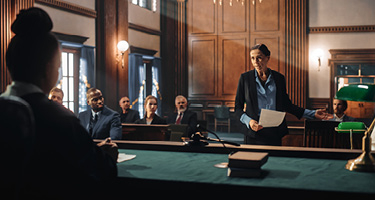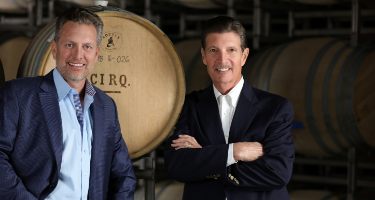A good starting point for providing great customer service to your clients is understanding the relationship isn’t about you. As lawyers, we’re important. As professionals, we possess technical skills and a high level of knowledge about our area of practice. Yet, we aren’t the focus of the relationship—the client is.
Several years ago, I misdirected this focus in the courtroom. It was the first of three hearings on the same file against a seasoned litigator and things were getting acrimonious. During cross‐ exam, the opposing attorney battered my client with a series of questions suggesting he blocked his employer’s efforts to return him to work. My client disputed this claim.
To counter the implication, I leaned forward in my chair to retrieve a letter from the file that I intended to use on redirect of my client. I leaned too far and lost my balance. I attempted to catch myself, but only worsened the situation, ultimately launching myself out of the chair and landing on my backside with my feet in the air. I stared helplessly up at the judge. The questioning stopped. The judge peered down over the edge of the bench and asked, “Are you alright, Mr. Kempston? Anything injured?” Chagrined, I responded that only my dignity had been injured. The judge, in turn, promptly retorted, “Dignity isn’t compensable under the Minnesota workers’ compensation law.” This observation generated a few chuckles.
I brushed myself off and sat back in my chair. We resumed the hearing. The next day, however, I was back at court for another matter. I ran into a different judge in the hallway, who grinned slyly and stated, “I heard you’ve taken to pratfalls in order to win your cases.” How embarrassing. Apparently the escapade made the judicial rounds. To this day, a certain judge still occasionally asks if I bring a seatbelt when I’m in the courtroom.
Humor aside, hitting the ejection button on my seat didn’t advance the case. On the floor, I became the central attraction. Instead of focusing on the client’s story, the judge locked in on me. As the focal point, I distracted attention from my client’s presentation. Accidental—but not helpful.
Other times, a lawyer intentionally usurps a client. The attorney ego often drives this eclipse of the client. Lawyers do like attention. We tend to think much of ourselves.
My sister would say I occasionally suffer from “lawyer‐itis.” This condition results from an overinflated sense of my own importance—sharpened by law school. To remedy the malady, my sister will hold up her left fist, representing me, and hold up her right fist, representing the world. She then slowly rotates the world around me—all the while shaking her head and saying “not.” It’s good to have truth‐tellers in your life.
This demonstration provides a good reminder. Just as the world doesn’t revolve around me, the lawyer isn’t the center of the client’s universe. The attorney‐client relationship doesn’t exist to serve the attorney; rather, it’s the other way around. Practitioners often confuse this order.
To keep the proper order in mind, focus on the nature of the task. I find it helpful to describe my role to clients as that of a glorified tour guide. By this, I mean my job as their lawyer consists of two main functions:
to guide them through a complicated system; and to tell their story—whether to an expert witness, a mediator, or the fact‐finder.
I’m not implying that as a tour guide, the lawyer is merely along for the ride. (All analogies break down if you push them too far.) Of course not.
We actively participate with the client. As counselors, we shape, mold, and contour the case—but we don’t create facts.
Over the years, I learned clients’ cases are better presented in court, when I get out of the way. If the attorney ego is less involved, clients receive better representation. While there is a place for theatrics, humor, or hyperbole in the presentation of a case, the best lawyers leave the smallest footprints. This approach focuses attention where it belongs—on the client’s story.
As a prophetic voice confessed about one who was greater, “He must become more, I must become less.” Lawyers are wise to heed this admonition. We aren’t the hub of the relationship.
-------------------------
David Kempston has spent over 25 years as a litigator, primarily handling workers’ compensation claims. He has been recognized by Super Lawyers every year since 2000. He frequently lectures on the MN Workers’ Compensation Statute and is a co-contributing author to a chapter in the MN Worker’s Compensation Deskbook (Chapter 7). He has also written a book, published through Amazon in 2017, entitled That’s Why They Call it Practicing Law.
































